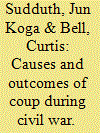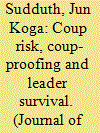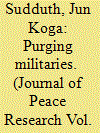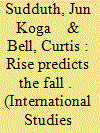|
|
|
Sort Order |
|
|
|
Items / Page
|
|
|
|
|
|
|
| Srl | Item |
| 1 |
ID:
154740


|
|
|
|
|
| Summary/Abstract |
Though approximately one in four coup attempts takes place during an ongoing civil war, scholars have not yet analyzed how the incidence of civil war affects coup attempts and outcomes. We conduct the first empirical analysis of the relationship between ongoing civil war and coup activity, finding (1) war increases the risk of a coup attempt, though (2) war-time coup attempts are significantly less likely to be successful, and (3) the risk of war-time coup is much higher when states face stronger rebel groups that pose greater threats to the political survival of the incumbent government. We attribute these findings to the pernicious effect of ongoing war on the welfare of the military elites and soldiers who have the greatest capacity to execute a coup attempt. As war diminishes their welfare and creates uncertainty about the future of the state, potential plotters become more willing to accept riskier coup attempts than they might plot during peace-time. Coup motivations are greatest when incumbents are more likely to lose their wars, and this causes coup plotters to attempt more and riskier coups when rebels are relatively strong.
|
|
|
|
|
|
|
|
|
|
|
|
|
|
|
|
| 2 |
ID:
151112


|
|
|
|
|
| Summary/Abstract |
Under what conditions do political leaders enact ‘coup-proofing’ strategies? There is a broad consensus in the literature that political leaders who face a higher risk of a coup will employ coup-proofing strategies that reduce the military’s capabilities to organize a coup. A closer look at the theory and empirical analyses of earlier studies, however, suggests that the presumed relationship between coup risk and coup-proofing should be re-examined. Drawing on insights from formal studies of authoritarian power-sharing, this article proposes that political leaders become less likely to initiate coup-proofing efforts as the coup risk increases. The reason is that leaders’ coup-proofing actions in themselves could prompt the military to launch a coup and thus political leaders will hesitate to offend officers when they face a high risk of a coup. The statistical models in this article estimate a latent coup risk by aggregating multiple indicators that capture the military’s willingness and ability to organize a coup. The empirical results strongly support the proposition that coup-proofing efforts taken by leaders decrease as coup risk increases.
|
|
|
|
|
|
|
|
|
|
|
|
|
|
|
|
| 3 |
ID:
180206


|
|
|
|
|
| Summary/Abstract |
The principal threat most autocratic leaders face stems from within the regime. To control militaries and mitigate the risk of coups d’état, many autocratic leaders repeatedly purge strong officers from the military. What are the causes and consequences of such purges? Despite its importance, scholars rarely have studied the question, as they have lacked a systematic and comprehensive dataset. The Military Purges in Dictatorships (MPD) dataset contains information on the dates and characteristics of 1,007 military purges, and covers 566 political leaders in 116 authoritarian countries over the period 1965 to 2005. In this article, I describe MPD, compare it with other datasets, present descriptive statistics on the data, and suggest its applications. By coding the timing and various characteristics of military purges, MPD facilitates empirical study of the relationships between autocratic leaders and their militaries, and thus is useful for researchers studying political violence, repression, civil-military relations, coup-proofing, leader survival, and regime transition.
|
|
|
|
|
|
|
|
|
|
|
|
|
|
|
|
| 4 |
ID:
158692


|
|
|
|
|
| Summary/Abstract |
How does the way a nondemocratic leader takes power affect the stability of their government? Prior research argues that irregular leader entries—those that violate the regime's norms for leader selection—are especially likely to foreshadow subsequent unconstitutional transitions. This article contends that some forms of irregular leader entry can actually protect leaders from subsequently being forcibly removed from office. When leaders use a strong and loyal coalition of supporters to overthrow not only their predecessors, but their entire ruling regimes, they demonstrate their strength to any potential rivals. Thus, leaders that gain power through, for example, successful rebellions, popular uprisings, and major regime-changing coups, deter subsequent challenges. They are substantially less likely to be ousted than leaders who take power in ways—such as via normal succession or reshuffling among ruling elites—that do not convey strength so convincingly. We assess our claims by analyzing an original dataset of nondemocratic leader transitions. We show that accounting for the strength demonstrated during a leader's entry to power substantially improves our ability to predict how, and when, that leader will eventually leave office.
|
|
|
|
|
|
|
|
|
|
|
|
|
|
|
|
| 5 |
ID:
177025


|
|
|
|
|
| Summary/Abstract |
Who punishes leaders via coups during civil war? By distinguishing between different types of internal audiences within the government and their attempts to remove a leader forcefully, I illuminate the mechanisms that explain variation in who punishes the leader during wartime. I claim that whether leaders are culpable for the initiation of the war has an important implication for whether they are punished by members of the ruling coalition (i.e., those with access to decision-making and political power), or by those outside the ruling coalition. Empirical evidence supports my hypotheses: (i) culpable leaders are more likely to experience coup attempts led by those outside the leaders’ ruling coalition, should the war go poorly; and (ii) nonculpable leaders are more likely to experience coups executed by members of their ruling coalition. The findings have important implications for how leaders respond to audience pressures as they consider whether to fight or settle.
|
|
|
|
|
|
|
|
|
|
|
|
|
|
|
|
|
|
|
|
|